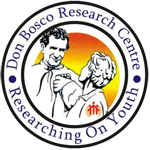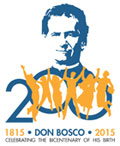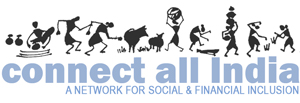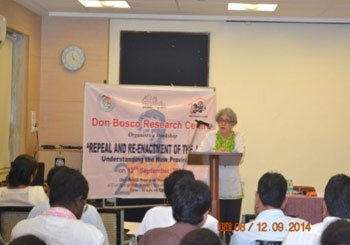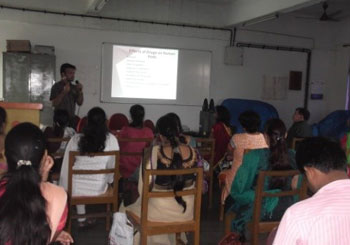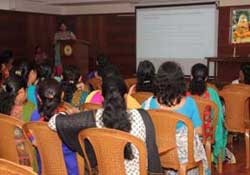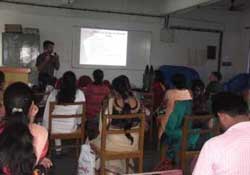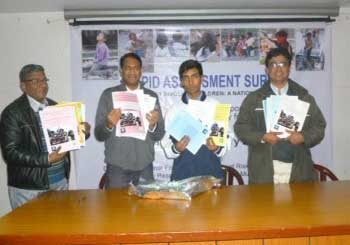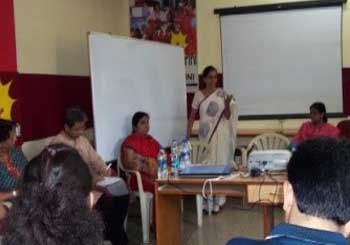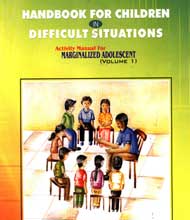
This is the first in the series of four and is targeted towards adolescents between 11 and 16 years of age. Meant primarily for use by staff working with vulnerable adolescents, this manual provides a comprehensive list of participatory learning activities, which will be very useful for individual and group assessment. It offers a range of interesting activities, verbal and non-verbal, which may be used ad per requirements. Learning takes place through use of diverse mediums such as focus group discussions, drawings, role-plays, story narration, outdoor games songs etc.- all of which will help sustain interest of not merely the target group but also the staff.
-
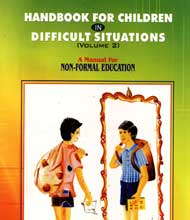
Education plays a vital role in improving the quality of life of the people. Despite the efforts of governmental and non-governmental organizations to bring all children into the fold of formal education, many children still continue to be out of school. Low socio-economic status of parents constrains them to send their children to earn at an early age, rather than to school. Therein lies the need to cover these children under the non-formal education scheme.
This manual on non-formal education (mainly for children between the ages 3 and 13) aims to bring about overall development of these children while at the same time gives them a chance to learn skills which are practically applicable in their daily life, so that they may enter mainstream society. It comprises short games and activities that a social/field worker can use while imparting non-formal education. It indicates different ways of explaining a single concept to the children, all cost efficient and at the same time ideal for the setting in which the class is conducted.
-
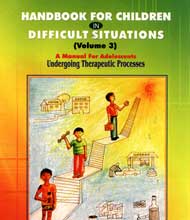
A Manual for Development of Children undergoing Therapeutic Processes is a resource manual designed to answer the urgent need for a holistic therapeutic program catering to the marginalized children. It is created for the facilitators or social workers, who like to deal with the target group in innovative and effective ways.
>
The manual is divided into three sections. The first section includes sessions for coping with the past life of the participants. The sessions help them to accept themselves and their past. The second section deals with reconstructing the present by polishing the participant's personality, communication skills and general understanding of self and society. The third section comprises planning for the future, implementation and follow-up.
-
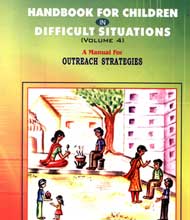
An outreach program is one of the most powerful tools used as a support system for marginalized children and adolescents (between 3 and 18 years of age). The aim is to strengthen the child and build up his capacities in his natural setting, rather than to bring him to an institution where, in the course of his stay, he frequently loses his edge, his resilience, and instead becomes dependent. This volume is targeted towards enhancing the street enablers diversity of intervention at different levels of interaction with children and adolescents - it comprises counseling strategies for individual and group contact, as well as planned sessions on issues like drugs, HIV/AIDS, education, health, hygiene, group life, sex education, entertainment, planning for their future and so on. This manual will be a handy reference guide to all outreach workers and the organizations working with marginalized children.
-
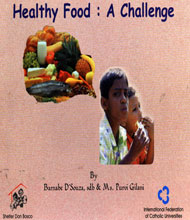
Food deprivation through poverty is the root cause of malnutrition, and in vulnerable children, both malnutrition and infection are widespread. Interaction with diverse groups of marginalized children and adolescents reveal that despite the vast amount of literature available on nutrition, the staff of various organizations often finds it difficult to plan out a suitable diet for children. This booklet aims to provide valuable information regarding basic foods and the nutritive values of each, interspersed with catchy illustrations to sustain the reader's interest.
-
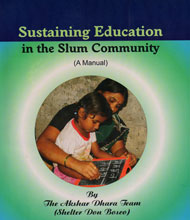
This publication explores ways and means to plan and develop strategies to help make the slum community more self-sufficient. Community groups undertake the task of guiding and stimulating educational development and understand the logical steps involved in the planning process. The manual also provides a range of activities for social workers to carry out in the community, to try and build up the whole community rather than just a few members. Stress is laid on education of marginalized children between 5-15 years of age, and more importantly on the education of families in the community- without which all developmental efforts would lack sustainability.
-
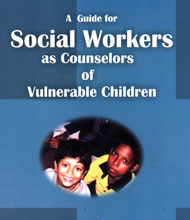
This manual tries to integrate knowledge of children into a framework that facilitates action. Divided into three major sections comprising basic skills in counseling, the process of counseling and issues involved, it lays emphasis on working together with vulnerable children to understand their subjective life experiences and the dynamic interplay of various inter-relationships. Each topic is substantiated by real-life examples or learning exercises, and encourages the readers to place themselves in the role of the social worker, internalize learning and practice specific counseling skills.
-
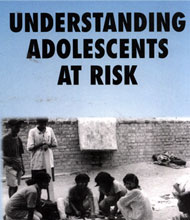
As society becomes increasingly complex, the social context of adolescence has undergone tremendous change and many are getting uprooted and marginalized in their attempt to fulfill their survival needs. This necessitates the recognition of adolescents, particularly marginalized adolescents as a special category for systematic study. This book is a collection of research studies and review papers on different aspects of marginalized adolescent development. It is hoped that this book will provide the necessary impetus, inspiration and commitment to promote the human capital in our youth by accommodating and addressing adolescent issues and concerns as a part of national human development.
-
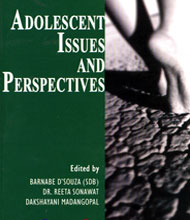
The phenomenon of adolescence has always evoked considerable interest among researchers and all those involved with their care. This book is a collection of 12 selected research and review articles contributed by experts in the field. Youngsters pose a constant challenge due mainly to their erratic temperament and shifting moods. The book presents an academic overview from acclaimed practitioners and covers topics as diverse as health, high risk behavior, pro social behavior, substance abuse, runaways and so on. This book is meant to enable all those working with youth to chart out a plan of action in building social capital and bringing about meaningful change in the lives of young people.
-
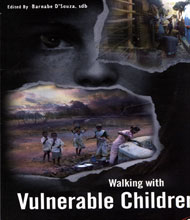
This is a compilation of the rich and varied experiences of those who work in the social and developmental sector. It is a first-hand account of social workers who have been closely associated with the lives of the marginalized and destitute. The book reflects the complexity of interactions, the associated problems and the simple strength of the social workers' convictions. The book can be an effective aid to youngsters and others involved in the field of social work. Drawing inspiration from the enriching experiences highlighted in this book will serve to enhance their commitment to making a difference in the lives of the under-privileged.
-
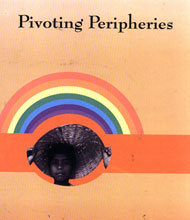
A participatory study pertaining to the development of marginalized adolescents was carried out by the International Federation of Catholic Universities, Paris, in association with Shelter Don Bosco, Mumbai. This book comprising six chapters, focuses on this vulnerable yet neglected section of society, those adolescents who survive on the fringes, who have forsaken the joys of childhood in order to take on all the burdens of adulthood. The book is meant to serve as a stimulus to action for all those responsible for the welfare of children and youth at risk, to enable them to fulfill their promises for the future.
-
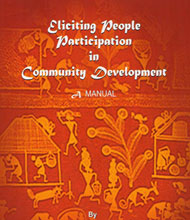
This manual explores the process of community participation in terms of the numerous elements and sub-processes that it involves. It has elements of conceptual discourse as well as lessons from actual practice. It is meant to serve as a guide for those with an interest in community development who wish to enhance their understanding of some of the fundamentals of community participation- the concept, the process and resources- and who want to initiate or further develop community participation processes. The process is what has been stressed in this manual.
-
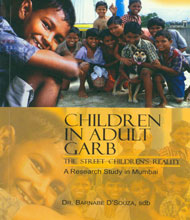
This book presents a holistic profile of street children in Mumbai, based on research carried out over a period of five years. It contains micro-studies of different aspects of their everyday lives including their food habits, health problems, high-risk behaviours and the NGO services they access. It offers reflective analysis and comparisons with slum children and other potential at-risk groups. The findings pertaining to multifarious aspects of street children's lives are synthesized in this book.
-
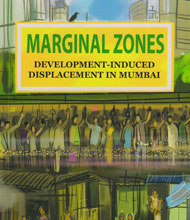
This book examines the complex phenomenon of development induced displacement caused by urban infrastructure projects in Mumbai. It attempts to view the development debate from the angle of 'real people'- those who actually bear its 'real costs'- and focuses on experiences to reveal the dynamics underlying each situation. It studies the consequences of such displacement on high risk groups like youth and women. While social costs have been identified, there is no blanket critique of development, but rather an evolution of a new resettlement paradigm which views the flux caused by displacement not as a pathology of modernity but as integral to development.
-
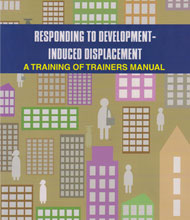
Over the past few decades, the problem of development induced displacement has become larger, more complex and geographically more widespread. Often, situations of internal displacement require communities, local, national and international authorities to develop innovative responses quickly. We believe that strategies for reinforcing the protection of vulnerable populations should help promote the stability required for their long-term recovery. This compilation intends to provide practitioners a variety of examples from the field of development induced displacement, based upon the experiences of those who have wrestled with this phenomenon and its manifestations in different political, cultural and developmental contexts. This manual serves to identify and address some issues of overriding concern such as empowerment of women, promotion of linkages among local authorities and so on.
-
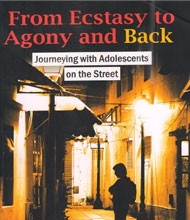
Sage Publications, 2012 presents - the journey of adolescent street drug-addicts-from psychological brokenness resulting from family disruption to the process of mending; from abuse, trauma and vulnerability to building up of self-esteem, talents and personality; and finally to the process of moving off the streets.
Based on the author's experience of working with the street children for over 26 years, the book explores the universe of street children interestingly, yet empathetically. The author discusses laws and policies affecting street children; root causes and their effects on them and their families; and the various stakeholders like agencies, employers, and institutions involved in their care and guidance.
The participatory action research discussed here views children as their own psychologists, creating meanings for themselves out of their own experiences and understanding. By taking ownership of their actions, street children begin to structure their moving off the streets, facilitating their rehabilitation and reintegration into society, thereby improving their status.
-
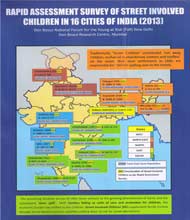
A Rapid Assessment of Street Involved Children was conducted in 2013 on a collaborative basis by the Don Bosco National Forum for Young at Risk (YaR), New Delhi, Don Bosco Research Centre (DBRC) Mumbai and the YaR centres of 16 cities in India. This project was first of its kind to assess and monitor the situation of street involved children in 16 cities in India. The Don Bosco Research Centre, Mumbai acted as the facilitator for the study and 16 cities included: Delhi, Chandigarh, Imphal, Shillong, Dimapur, Guwahati, Kolkata, Mumbai, Goa, Baroda, Bangalore, Hyderabad, Vijayawada, Chennai, Salem and Thiruvananthapuram. The study was primarily aimed at providing an estimation of street involved children in each city and along with the socio-demographic and economic facts that would eventually influence child centred policies and programmes and adequate budgetary allocation.
Major findings of the study included a census enumeration of 129896 children, with 90122 boys and 39774 girls in 16 cities. Delhi accounted for the highest number of street involved children (69976), followed by Mumbai with 16,059 and the least number of children were found in Thiruvananthapuram (140). Children between the ages 10-15 years constituted the highest number indicating the propensity of this age group towards risk taking. Interview with random sample of 3993 children in the age group of 8-17 years showed children residing in the slums outnumbered orphaned abandoned or run away children on the street indicating a growing trend of slum-spill. More than half the children lived either with single or both parents, primary level of education was generally observed to be the maximum level of education attained by the children interviewed, with a high rate of drop out. In addition, the growing incidence of slum spill, families surviving on streets, project displaced homeless families all contributed to the street children population. Street as the main dwelling place was seen in cities like Delhi, Chennai and Baroda. Life on the streets was revealed to be strongly linked to poverty. Families who were economically and socially marginalized had become seriously dysfunctional, and this placed their children in circumstances that resulted in them leaving home and trying to survive in the often unprotected and hazardous street milieu and many of them engaging in economic activities to augment family income. A high volume of rural to urban and inter and intra state migration due to disaster or development project have not only left many rootless and roofless but stripped the children off from their education and right to live with dignity.
In the light of the rapid assessment survey, following recommendations are suggested:
|
| 1. | Ensure education to all children (up to 17) under RTE and not only to children between 6-14 years
|
| 2. | Ensure the protection of rights and entitlements of migrant children through the formulation and effective implementation of relevant policies
|
| 3. | Develop a systematic and reliable data base on Slum Children Population with gender breakup upto 17 years in every state for addressing poverty alleviation programmes
|
| 4. | Substantial increase in the Children's Budget for protection
|
| 5. | Each city can plan different projects for enhancing the educational, social and economic development of Street Involved Children to avail the budget under ICPS for child protection
|
| 6. | Not only street children but also their families and communities must be part of a longer-term strategy to facilitate the reintegration of street children and to prevent further migration to the streets
|
|
